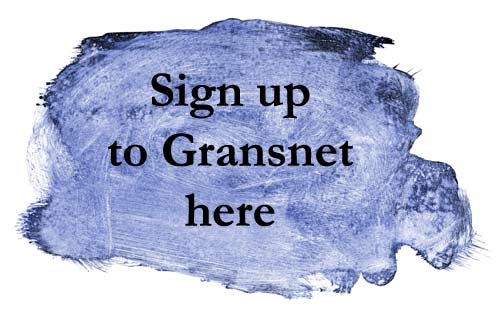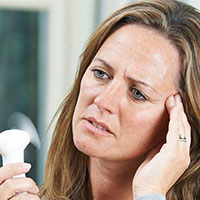Brussels police ordered to attend a right wing conference attended by Braverman and Farage

Perimenopause symptoms and treatment - what you need to know
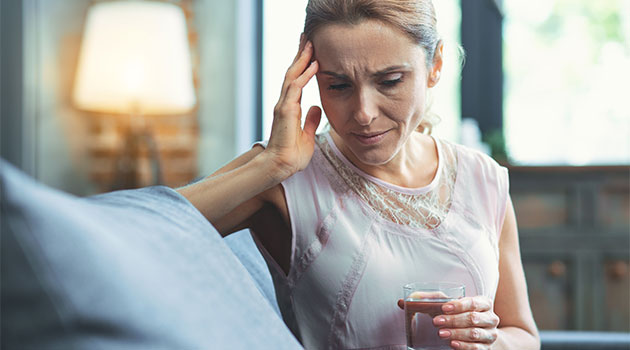
The first signs of perimenopause can feel incredibly intrusive and disruptive, so it's helpful to know what to expect and how to deal with it. Maybe you've recently found yourself wondering 'what are the symptoms of perimenopause?', or perhaps you've had them for some time, but still feel like you are struggling to cope with them? Here's our guide to perimenopause: the symptoms, diagnosis and treatment, as well as the collective wisdom of 250,000 gransnetters on how to cope with this change.
What is perimenopause? | Perimenopause symptoms | Diagnosis
Complications | Treatment | How to ease symptoms
Join our menopause forum for support and advice
What is perimenopause?
Perimenopause refers to the period when women start to experience the changes that will eventually lead to the menopause. Referred to as the 'menopause transition', women start to produce less oestrogen gradually during this time, which leads to premenopause symptoms like hot flushes, night sweats, sleep disturbances, tiredness and mood swings. There may also be changes to the menstrual cycle but, despite the fact your oestrogen levels are declining, it is still possible to become pregnant during perimenopause.
The extent to which women experience signs of perimenopause also varies greatly. While some have few or no symptoms, others will experience all or most of the common symptoms in the course of their transition to menopause.
What age does perimenopause start?
In the UK, the average age of menopause is 51. For some women, perimenopause symptoms may start as early as their mid-30s, while others will begin to experience perimenopausal-related changes in their 40s. Some gransnetters have even reported experiencing perimenopause in their 50s. In other words, the 'normal' perimenopause age is quite difficult to pinpoint.
How long does perimenopause last?
Perimenopause typically lasts for around four years. It can, however, last for 10 years after you first begin symptoms. It's the first stage of menopause, and ends when you actually reach the 'menopause' stage, which is defined as when your menstrual periods have ceased for 12 consecutive months, marking the end of your fertility.
Perimenopause symptoms and signs
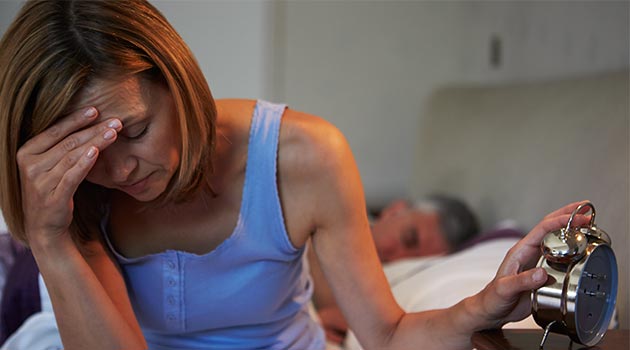 Changes to hormone levels can have a huge impact on how you feel - physically and mentally. If you've found yourself wondering 'am I perimenopausal?', it's worth learning about the different signs to look out for so you know what to expect.
Changes to hormone levels can have a huge impact on how you feel - physically and mentally. If you've found yourself wondering 'am I perimenopausal?', it's worth learning about the different signs to look out for so you know what to expect.
Oscar-winner Gwyneth Paltrow made headlines recently when she spoke of her experience with perimenopause: “You’re just all of a sudden furious for no reason." It's a frequent symptom that gransnetters have reported, but what are the other early signs of perimenopause?
Common symptoms:
- Hot flushes and night sweats
- Trouble sleeping and general tiredness
- Changes in mood, including irritability or depression
- Loss of libido (sex drive)
- Vaginal dryness
- Sore breasts
- Urinary urgency and other 'mild' bladder problems
- Hair loss/thinning
- Changes in menstrual cycle, including irregular, heavier or more painful periods
- Disorientation
- Weight gain
Less common symptoms:
- Headaches and migraines
- Change in balance or dizziness
- Development of (or worsening of) allergies
- Gum problems
- Itchy skin
- Urinary incontinence
- Thinning nails
- Memory lapses
Gransnetters say:
"I had a couple of years in my mid-50s when I had very heavy bleeding and really bad migraines."
"I had no hot flushes, sweats, headaches or anything else."
"So, thinning body hair might be a sign of perimenopause? I've been waxing my fuzzy legs for 25 years, except in the last year where the hairs have gotten finer and more sparse... This coincides with raging mood swings, palpitations, a couple of hot flushes, bad sleep, breast pain, spots, aches and pains."
Are my symptoms normal?
As most women will experience a combination of symptoms, it is normal to question whether you should be seeking help. As ever, if you're worried about anything, see your doctor who will be able to give you more advice about typical symptoms, treatment and whether what you're experiencing is normal.
Perimenopause diagnosis: talking to your GP
"I always coped very well with stress and pressure, and am not emotional. It all changed when the hormones started playing up! My GP said it is like when you first start getting periods: hormone fluctuations and irregular periods, like the reverse of the start of it all."
 Should you start to experience extreme or disruptive symptoms, or if you feel that your symptoms are unusual or worsening, or generally making life difficult, it's a good idea to speak to your GP. For example, whilst it is normal to experience irregular periods during perimenopause, if they suddenly become very heavy, include unusual blood clots, last several days longer than usual or occur closely together, it could be a sign that something else is happening to your body. This is also the case if you find that you are spotting after sex.
Should you start to experience extreme or disruptive symptoms, or if you feel that your symptoms are unusual or worsening, or generally making life difficult, it's a good idea to speak to your GP. For example, whilst it is normal to experience irregular periods during perimenopause, if they suddenly become very heavy, include unusual blood clots, last several days longer than usual or occur closely together, it could be a sign that something else is happening to your body. This is also the case if you find that you are spotting after sex.
It's beneficial to visit the doctor to determine whether your symptoms could be linked to something else, such as hypothyroidism. Symptoms of hypothyroidism can sometimes be similar to those of perimenopause, as they include tiredness, weight gain and depression. Hypothyroidism can be diagnosed with blood tests, so your GP will be able to determine if your symptoms are related to a thyroid problem rather than perimenopause.
There are some factors that affect perimenopause. If they apply to you, it is more important that you consult your GP. These are:
- Smoking - it has an adverse effect on perimenopausal symptoms (they may occur earlier and be more severe).
- Surgeries - women who have had a hysterectomy (removal of the uterus), single or bilateral oophorectomy (removal of one or both ovaries), or cervical cancer/pelvis surgery have reduced amounts of oestrogen and progesterone in their bodies which can lead to early menopause.
- Chemotherapy and radiation - both will significantly increase the risk of early onset menopause.
- Family history - women with a history of premature menopause in their family have an increased risk of experiencing premature menopause themselves.
Gransnetters say:
"I wish I'd had a more thorough test for perimenopause as that time of life also coincided with the start of hypothyroidism... I should have gone to GP to confirm, but I didn't and it took ages to diagnose."
"Perimenopause started when I was 46 and was confirmed by a blood test. Periods became very heavy and painful, but thankfully I had no other symptoms. I was 55 when I eventually went through menopause so the whole process took more than nine years."
Complications
Due to changing hormone levels, perimenopause can sometimes lead to the following health complications:
- Osteoporosis - decreasing levels of oestrogen causes bone loss and increases the risk of fractures and breaks. It is important to include sufficient calcium in your diet.
- Diabetes - whilst the production of other hormone levels fall, some women develop high levels of testosterone, which has an impact on the regulation of blood sugar. This can result in an increased risk of insulin resistance.
- Prolapsed uterus - oestrogen helps strengthen muscles, which means that decreased levels may result in a 'dropped' uterus as the muscles weaken.
- Cardiovascular disease - falling oestrogen levels increase the risk of developing heart and circulatory system disorders such as high blood pressure, stroke, heart disease and high cholesterol levels. This is because oestrogen helps to regulate the blood fat content.
Get more health advice delivered straight to your inbox...
Perimenopause treatment
If your perimenopause symptoms are severe, you and your GP can discuss a variety of prescribed treatment options. There may be other treatments available that are better customised to your individual needs, so be sure to ask about those too.
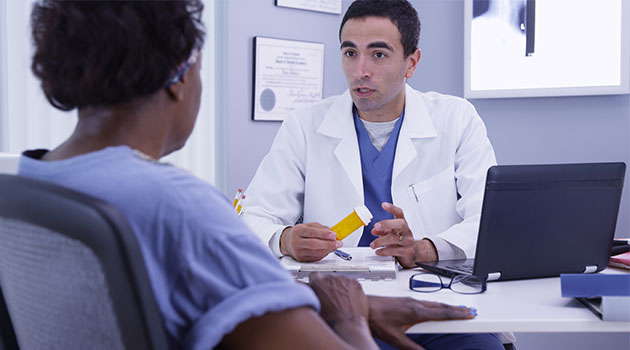
HRT (Hormone Replacement Therapy) can greatly benefit some women, however there are risks involved so be sure you're properly briefed by your GP on potential pros and cons. Bear in mind that HRT won't be an option for women who've had certain health problems in the past.
Vaginal rings or contraceptive patches provide a low dose of oestrogen which can help to control symptoms like hot flushes, but there are also risks associated with these.
Certain antidepressants (SSRIs) have also been shown to mitigate hot flushes and night sweats.
Your doctor will be able to advise on the best treatment for you.
Gransnetters say:
"The only thing that worked for me in the worst years of the menopause was HRT. All symptoms vanished and I had no side effects."
"The birth control pill really helped my PMT problems and made a huge difference to my mental health until a savvy young doctor picked up on the fact that I had a history of aura migraines and so should not be taking the pill at all due to a double whammy stroke risk. This means that when the time comes, HRT is ruled out for me."
8 ways to ease perimenopause symptoms
The effects of perimenopause can be more than just annoying - especially if they impact upon your day-to-day life. Luckily, there are some simple methods and lifestyle changes which can help with the first signs of menopause and lead to better health in general.
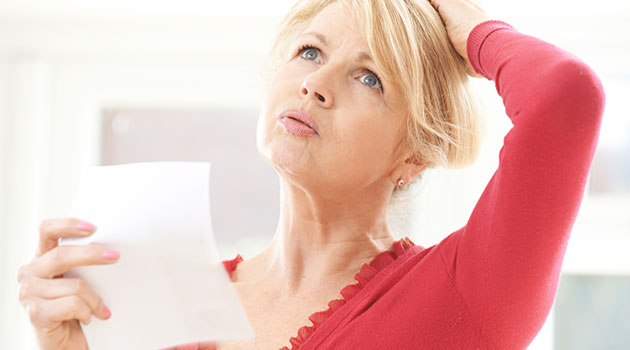
1. Keep cool when hot flushes occur
"When night sweats happen, get a fan! I found this to be invaluable. I bought a tall freestanding one that had three settings and could be worked by remote control from the bed. I dumped the duvet and used layered cotton sheets or toppers of different weights."
"For the flashes, I found wearing light cotton clothes helpful. And light cotton nighties rather than pyjamas are best at nighttime. Someone suggested drinking water when a flush started, which also worked for me."
"Get one of those little canisters of water spray. Boots have them. Great for cooling down during a flush."
Those tropical moments aren't fun - so effective ways of tackling the sweats and keeping your body temperature down are sought after. Hot flashes are one of the most common early symptoms of menopause, so investing in a powerful fan or cooling gel pads for your bed is worthwhile.
2. Keep fit with exercise
"I went to the doctor but was refused HRT, so I upped my exercise and tried to eat better."
While exercise may not directly tackle common perimenopause symptoms, taking time to exercise a few times each week can help maintain a healthy weight, ease stress and boost your happiness - and with low moods frequently reported as a troublesome side-effect during this time of life, those endorphins really do help.
3. Adapt to a healthier diet...
"Food helps! Avocados, asparagus, spinach, etc. And only consume caffeine and alcohol with food. Vagifem pessaries certainly help with dry and sore vaginas (they contain a small amount of HRT)... and exercise is essential - particularly walking and strength training."
As we age and lose muscle mass, our metabolism slows down - meaning we're more likely to pile on the pounds than when we were younger. The good news, however, is that ensuring you have a balanced diet and maintain a healthy weight can relieve some symptoms of menopause.
4. ...and check your vitamins
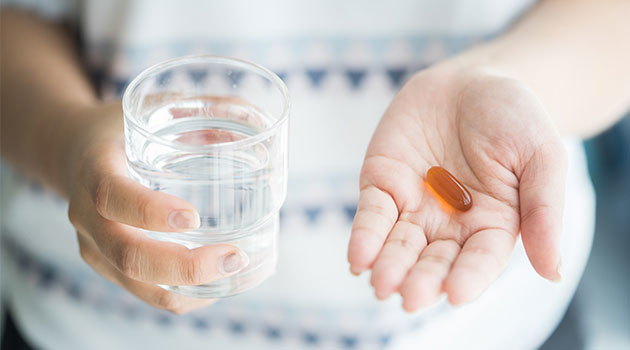
"I took Menopace Calcium for a while a couple of years ago and it worked a treat, and almost instantly. I opted for the calcium version just because we need it for the old bones after menopause."
At any stage of life, it's essential that you get the right vitamins and minerals your body needs, but during perimenopause, falling oestrogen levels can lead to bone loss so it's crucial you get enough calcium in your diet. It's worth speaking to your GP about multivitamins you may need.
5. Stop smoking and cut down on caffeine and alcohol
"I had a hysterectomy at 38. I am now 58 and was advised by my specialist not to take HRT and it's been 20 years of hell. I have tried most alternatives, but I have to say alcohol and caffeine definitely make the flushes worse."
"For the hot flushes, cut back on alcohol and cream. The difference is incredible."
Evidence suggests that smoking is bad news for hot flushes - and the same goes for caffeine and alcohol too. So if you're suffering, it may be worth cutting down on your vices pronto. If the thought of bidding goodbye to a lunchtime smoke or an evening G&T is unbearable, we have plenty of gransnetters on hand for advice and support on our forums.
6. Stay hydrated
"Water is not boring it's very refreshing and healthy."
Keeping hydrated can help with hot flushes, as well as ward off dehydration you may experience during this time, particularly after a bout of night sweats. Drinking water can also boost your mood, mental performance and hydrate skin - that's what we call a win-win. Aim for six to eight glasses a day.
7. Sleep and perimenopause - don't give up!
"I found the pillows that stay cool and a big fan by the side of the bed at night really helped me."
Try to find a sleep routine that works for you and stick to it to make sure you get enough rest every night. Although it's easier said than done, it's important you get enough rest and if you're struggling, it may be worth keeping a sleep diary to establish patterns and talking to your GP.
8. Try natural perimenopause remedies
"I’m 54 and have had just about every symptom associated with the menopause. I take black cohosh and have had a course of acupuncture that has worked wonders."
Gransnetters have shared some natural alternative remedies here that helped them manage the symptoms of perimenopause and menopause. However, it can't hurt to mention any supplements you are considering taking to your GP.
Visit our health section for more advice on perimenopause and menopause symptoms.
Disclaimer: The information on our health pages is only intended as an informal guide and should not be treated as a substitute for medical advice. Gransnet would urge you to consult your GP before you begin any diet if you're concerned about your weight, have existing health conditions and/or are taking medication.
Images: Shutterstock
